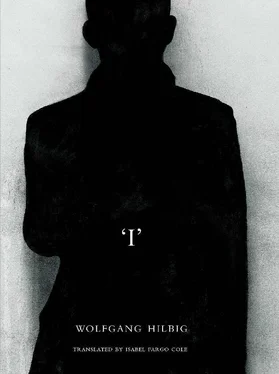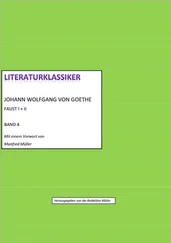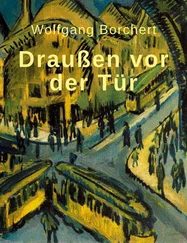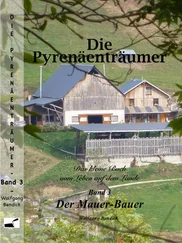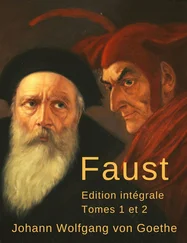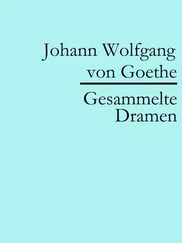Now I stood across the street from my house, staring up and telling myself I didn’t even know for sure whether I lived on the fifth or sixth floor or which were my windows. . it had to be the ones that projected from the roof above the gutter in the form of little gables; and most of these windows were located around the corner, looking out on W. Strasse. . and at that moment I recalled the well-turned words of the boss, the potentate of A., who had pronounced: You see best from the dark into the light. .
Was this also true within a delusion? Perhaps in the darkness of delusion you also looked now and then into a light. . and perhaps this was a sort of lucid delusion. More than once in his breezy way the boss had told me he would miss me; now I was keen to favour him with my presence, only temporarily, of course, as long as this feeling persisted within me, one I found so hard to describe, unless I were simply to call it my disappointment with the city of Berlin.
For me Berlin had become a city of depression. . that was probably how I’d have to put it. I had the impression that its rough or hearty vitality was barely to be felt now, the city merely blathered now, a sort of vacuous chatter had surfaced here, sounding as though it couldn’t go on much longer, as though after it nothing could go on any longer, and it was impossible to deny that it had infected me as well — I felt it every day, huddled over my writing attempts. — The city’s heart was broken, it was impossible to tell what had broken it, and I believed it had been this way since the start of the year. . spring had come to the city without warmth and stayed that way — there were no more events like the one in Rummelsburg in April of last year (it could have been two years ago, but I disregarded that for now), everyone seemed to brood away in bafflement, like me. . Fog, damp and smoke slouched through the streets like shapeless grey ghost mobs, the tattered nights fell like colourless filth-soaked bunting, the whole city gasped and wheezed with an invincible Hong Kong flu. Meanwhile I sat up in my flat tackling the fourth or fifth rehash of my last report on Operation: Reader. . it was to be the last about this writer who had introduced a new variety of verbosity to the Scene, coupled with unctuous affectations to boot. I was inventing a conversation I’d supposedly overheard. . I had never once observed a conversation, neither seen nor heard one, and in my past reports I’d explicitly mentioned this very fact; now I had to break this pattern, now I typed onto the paper all sorts of variants for his departure from habit. . it had to sound plausible; it was incredibly hard, I discovered, to put to paper a halfway-realistic slander, the language no longer seemed willing, the signs as unsuited as could be, the words clearly stemming from the time after the slander — like Beckett’s words, for instance — they ceased to cooperate when you tried to return to the time before. .
I had spent several days pondering what this conversation could have been about. . the greatest difficulty was that I couldn’t reveal the other interlocutor; it was almost impossible to invent a conversation in which I didn’t mention the man, or woman, he was talking to. . how implausible to write that all I’d seen was a little bit of the back of her head. And what should the conversation be about. . Watch out, he really wants to go West! — that should be the gist of it (the example came from the boss in A.). . He really wants to, that’s what I’ve found out! — Of course that was too little, Reader ought to have at least said that it was high time to infiltrate the embassy refugees! — In all likelihood I’d have to tail him through the city first, all the way to where he lived, since I’d never heard a word from him on private things; as far as I knew, he lived somewhere in Weissensee, or in an area south of that district, not far at all from my company flat. .
But the flu with the Asian name (evidently supposed to indicate its place of origin) gripped me in its claws; the typewriter letters swam before my eyes. The farthest I could make it was out to Frau Falbe. . at least the flu didn’t seem to cripple the sex drive, maybe it even had the opposite effect — the flu ravaged the body’s periphery and impaired the internal organs that served self-preservation; it shut down the sensory system but for the functions that caused pain, and that evidently included the tangible signals of the reproductive mechanism. On a permanent basis it seemed that just before overall viability collapsed, the remaining intact brain cells caused the failing heart to pump blood yet again into the male corpus cavernosum, painfully straining the spermatic cords one more time. The Hong Kong flu seemed to reduce the human male to a simple semen machine. . and the illness was said to announce itself in women with labour-like pains in the pelvic region.
Feuerbach later claimed that the term Hong Kong flu was a state-decreed euphemism. It was actually called the Peking or Shanghai flu , and yet this had nothing to do with the overpopulation there.
Incidentally, Frau Falbe had told me I could go on and try to give her my cold, she wasn’t that susceptible to the sniffles. . I thought about that constantly as I brooded over the typewriter. How many times had I already started over, the wastebasket was filled with crumpled-up pages where I’d broken off at the phrase the language of the basement . . on the one hand, it was supposed to describe the style of the author S. R.; on the other, I thought the phrase might keep the student out of it.
(Even in the basement, yes, even in the basement the light had burnt. The light bulb he’d screwed in himself, by the concrete wall at the end of his underground path — to his horror its dull radiance had shone out at him even before he turned the last corner. . In reality, only he himself could have forgotten to extinguish it, he thought; sometimes time was too short to walk back again after the light in the following section of the passage had been switched on. Otherwise everything was as usual, the air moist and cool with the slightly acrid tang the atmosphere absorbed from the ever-new concrete wall. . just as the entire country’s air took on a harsh smell from the concrete of an ever-new Wall. . his wooden crate intact against the wall, the gigantic phallus intact upon the wall, the fear of having long been frequented down here — intact. — In front of this wall, he thought, was the epicentre of the Hong Kong flu. This was where he’d caught it, the night he came rain-soaked from Alexanderplatz after the train had stood so unduly long in the Warschauer Strasse Station and he’d wanted to wait another hour or two in the basement because he’d seen a light up in his flat. . Feuerbach must have overtaken him in the car, he thought, and was waiting upstairs in the flat already; he sensed that he’d offended his case officer this evening, and now he wanted to let a few days pass before meeting him again. . his watch showed one, afternoon or morning.
And down here was the taste of the flu. . if it hadn’t existed, he could have invented it now — it was in his body, a volume of cold, caustic concrete, it crept up from his body and imparted its grey cement taste to his mouth, and the sense of ceaselessly crushing gritty viruses with his teeth; here before the concrete was the hotbed of the virus that had transformed the city into flowing snot. . the first symptom of the illness was depression.)
I typed a row of X’s over the phrase the language of the basement and wrote over it: the language of depression . . immediately that seemed just as wrong. At that moment the key turned at my front door, the bolt snicked back, I heard Feuerbach’s soft tread in the long narrow corridor. — Open the window, for Chrissake, he exclaimed, you’re invisible in all that smoke! — And already he was flinging open the window himself, grabbing a sheaf of paper from the desk and propelling the air towards the open window in frantic sweeps; indeed, it contained more cigarette smoke than oxygen.
Читать дальше
